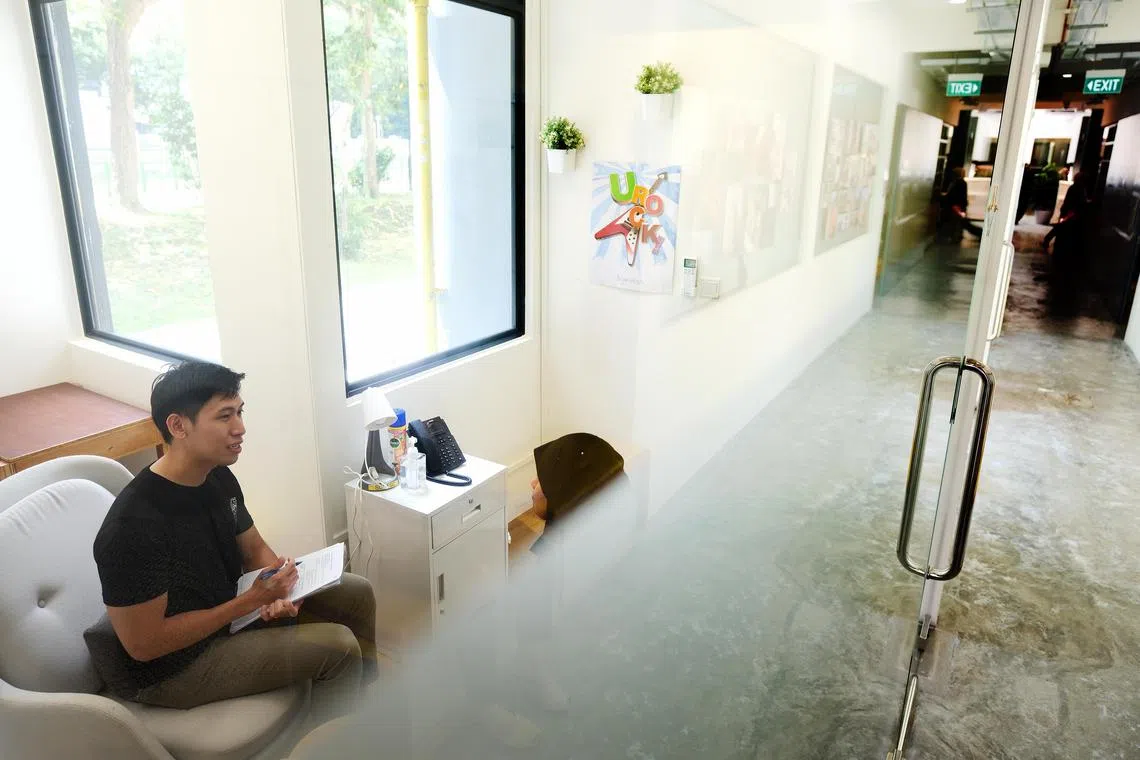First dedicated social service centre set up to help lower-income transnational families
Sign up now: Get ST's newsletters delivered to your inbox

Families where one spouse is a Singaporean or PR and the other is a foreigner face problems from almost every aspect of life, from healthcare to education and employment.
PHOTO: LIANHE ZAOBAO
SINGAPORE - Madam R, an Indonesian woman in her 60s, has been the sole caregiver of her three Singaporean grandchildren since they were young.
Her Singaporean son-in-law was jailed and is estranged from his children, while her daughter had been deported back to Indonesia.
Madam R began to worry about her ability to look after her grandchildren after she had a fall in 2022 and the back pain affected her mobility, said Ms Kanak Muchhal, manager of South Central Community Family Service Centre’s (FSC) The Inclusive Fund.
Madam R also fretted about her medical bills.
As a foreigner, she does not get the subsidies Singaporeans and permanent residents (PRs) get at public hospitals here. Thankfully, the fund paid for her medical treatment in Batam.
It also linked her up to the Mount Alvernia Hospital Community Outreach Team, which has a programme that supports needy transnational spouses by providing them with heavily subsidised primary care at the Mount Alvernia Outreach Medical and Dental Clinics, among the forms of healthcare aid given.
In Singapore, transnational families often comprise a Singaporean man with his foreign wife and their children.
Madam R went through a procedure to treat the fracture in her vertebrae, among the host of diagnostic tests and consultations she had at Mount Alvernia, a not-for-profit hospital.
The total cost of treatment came up to about $26,000, said the hospital’s assistant director of community outreach Anthea Neo, but the hospital and the doctors waived their fees.
Meanwhile, Pro Bono SG, a charity which provides pro bono legal aid to the needy, is helping the grandmother to apply for a long-term visit pass so she can stay in Singapore for a longer period of time.
Ms Muchhal said: “Madam R shared that she is truly grateful and happy for the help she has received. It has significantly reduced her worries and struggles.”
The grandmother is among those supported by Pro Bono SG and South Central Community FSC’s The Inclusive Fund. The fund was set up in 2021 to help lower-income transnational families.
Both non-profit organisations took a step further in 2024 by setting up the Transnational Family Care Centre, the first social service centre in Singapore dedicated to serving the needs of lower-income transnational families.
The centre, which had its official launch on July 15, offers a range of legal and social assistance for these families, which are households with at least one Singaporean or PR.
Representatives from Pro Bono SG and South Central Community FSC said the new centre would enable them to provide more integrated care for these vulnerable families.
Transnational families face problems in almost every aspect of life, from health problems and marital woes to education and employment challenges.
The transnational spouse often seeks help for divorce and maintenance issues and immigration matters, they added.
Ms Sadhana Rai, head of representation at Pro Bono SG, said, referring to the foreign family member: “If we don’t help them, they are stuck in a cycle of systemic challenges, from healthcare to accommodation, as they don’t get the same financial support Singaporeans get.”
Ms Rai said that the foreign family member does not qualify for pro bono help under the national legal aid schemes, such as from the Legal Aid Bureau, so Pro Bono SG has a Family Justice Support Scheme which provides pro bono legal aid to lower-income foreign spouses with Singaporean children.
Ms Muchhal said The Inclusive Fund was started to bridge gaps in services for transnational families and it is funded by private donors and foundations.
Among the range of help given, the fund supports these families’ educational and employment needs, provides them with medical care and helps them with their immigration issues.
For example, some of the foreign wives have children from their previous marriages who are now living with them in Singapore. But if the child is a foreigner, they have to pay foreigners’ rates, and the family cannot afford the school fees.
So far, the fund has supported 28 families, seven of which have also received legal help from Pro Bono SG.
Uptick in transnational marriages
The new centre comes as the proportion of citizen marriages involving a Singaporean and a non-resident has increased, as data released on July 15 by the Ministry of Social and Family Development
In 2023, 26.2 per cent of all citizen marriages involved a Singaporean and a non-resident, or someone who is not a Singaporean nor PR. This is up from 23.7 per cent in 2022, but the 2023 figure is lower than in some of the years before the Covid-19 pandemic struck.
A citizen marriage is one that has at least one Singaporean.
Of these Singaporean and non-resident marriages in 2023, about seven in 10 were between a Singaporean groom and a non-resident bride.
The report also showed that a larger proportion of these non-resident brides were older and more educated.
For example, the share of such brides under the age of 25 fell from 21.2 per cent in 2013 to 7.9 per cent in 2023.
Professor Jean Yeung, director of social sciences at the Agency for Science, Technology and Research’s Singapore Institute for Clinical Sciences, said that border closures due to the Covid-19 pandemic had led to fewer transnational marriages in 2020 and 2021. Since borders have reopened, the numbers of such marriages have risen, she said.
Prof Yeung, who is also a professor at NUS’ Yong Loo Lin School of Medicine, said that women are getting more educated globally. They are also marrying at a later age, as they pursue higher education.
She added: “In general, this is good for all involved, as education is positively related to one’s knowledge, skills and health, (which are) crucial components of human capital that are likely to contribute to better psychological and economic well-being for themselves and for their families.”



